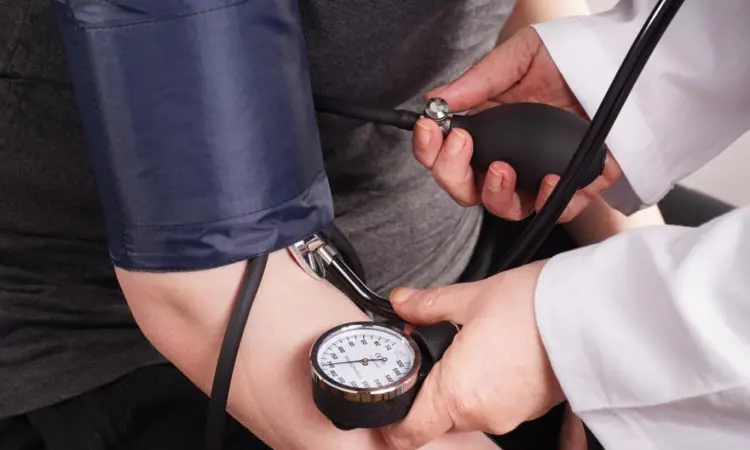- Home
- Medical news & Guidelines
- Anesthesiology
- Cardiology and CTVS
- Critical Care
- Dentistry
- Dermatology
- Diabetes and Endocrinology
- ENT
- Gastroenterology
- Medicine
- Nephrology
- Neurology
- Obstretics-Gynaecology
- Oncology
- Ophthalmology
- Orthopaedics
- Pediatrics-Neonatology
- Psychiatry
- Pulmonology
- Radiology
- Surgery
- Urology
- Laboratory Medicine
- Diet
- Nursing
- Paramedical
- Physiotherapy
- Health news
- Fact Check
- Bone Health Fact Check
- Brain Health Fact Check
- Cancer Related Fact Check
- Child Care Fact Check
- Dental and oral health fact check
- Diabetes and metabolic health fact check
- Diet and Nutrition Fact Check
- Eye and ENT Care Fact Check
- Fitness fact check
- Gut health fact check
- Heart health fact check
- Kidney health fact check
- Medical education fact check
- Men's health fact check
- Respiratory fact check
- Skin and hair care fact check
- Vaccine and Immunization fact check
- Women's health fact check
- AYUSH
- State News
- Andaman and Nicobar Islands
- Andhra Pradesh
- Arunachal Pradesh
- Assam
- Bihar
- Chandigarh
- Chattisgarh
- Dadra and Nagar Haveli
- Daman and Diu
- Delhi
- Goa
- Gujarat
- Haryana
- Himachal Pradesh
- Jammu & Kashmir
- Jharkhand
- Karnataka
- Kerala
- Ladakh
- Lakshadweep
- Madhya Pradesh
- Maharashtra
- Manipur
- Meghalaya
- Mizoram
- Nagaland
- Odisha
- Puducherry
- Punjab
- Rajasthan
- Sikkim
- Tamil Nadu
- Telangana
- Tripura
- Uttar Pradesh
- Uttrakhand
- West Bengal
- Medical Education
- Industry
Bedtime Dosing for Blood Pressure Drugs confers no added advantage: JAMA

Researchers have found in a Canadian randomized trial comparing morning and bedtime administration of blood pressure medications that there was no significant difference in cardiovascular outcomes. This held true both in primary care settings and in a related nursing home study. The results highlight that consistent medication adherence is more crucial than the timing of administration. This study published in JAMA was conducted by Scott R. and colleagues.
Hypertension is a potent risk factor for cardiovascular disease, including stroke, acute coronary syndrome, and heart failure. The literature has reported improved cardiovascular outcomes from nighttime control of blood pressure but with inconclusive evidence. In this study, the goal was to provide evidence regarding whether bedtime administration of antihypertensive agents reduces cardiovascular risk and safety outcomes.
This was a 3,357-person trial among hypertensive adults (56.4% female; median age, 67 years) that included recruitment via 436 Canadian province-based primary care clinicians. All participants were randomized in a 1:1 fashion to ingest all antihypertensive once-daily medications at bedtime (n = 1,677 in intervention group) or in the morning (n = 1,680 in control group).
Participants were older adults with hypertension who were on at least one once-daily antihypertensive drug. The major outcome was the time to initial event of all-cause mortality or hospital/emergency department (ED) visit for stroke, acute coronary syndrome, or heart failure. Secondary outcomes were unplanned all-cause hospitalizations/ED visits, and visual, cognitive, and fall- and/or fracture-related safety endpoints.
Key Findings
• The rate of the primary outcome event was 2.3 per 100 patient-years in the bedtime group and 2.4 per 100 patient-years in the morning group (adjusted hazard ratio, 0.96; 95% CI, 0.77–1.19; P =.70).
• There were no significant differences between the two groups for individual components of the primary outcome (stroke, acute coronary syndrome, heart failure).
• Safety outcomes such as falls, fractures, glaucoma diagnosis, and 18-month cognitive impairment were not different between groups.
This large clinical trial showed that evening dosing of antihypertensive drugs did not decrease cardiovascular risk in comparison to morning dosing. Medication timing should be driven by patient preference rather than hopes for cardiovascular advantage.
Reference:
Garrison SR, Bakal JA, Kolber MR, et al. Antihypertensive Medication Timing and Cardiovascular Events and Death: The BedMed Randomized Clinical Trial. JAMA. Published online May 12, 2025. doi:10.1001/jama.2025.4390
Dr Riya Dave has completed dentistry from Gujarat University in 2022. She is a dentist and accomplished medical and scientific writer known for her commitment to bridging the gap between clinical expertise and accessible healthcare information. She has been actively involved in writing blogs related to health and wellness.
Dr Kamal Kant Kohli-MBBS, DTCD- a chest specialist with more than 30 years of practice and a flair for writing clinical articles, Dr Kamal Kant Kohli joined Medical Dialogues as a Chief Editor of Medical News. Besides writing articles, as an editor, he proofreads and verifies all the medical content published on Medical Dialogues including those coming from journals, studies,medical conferences,guidelines etc. Email: drkohli@medicaldialogues.in. Contact no. 011-43720751


